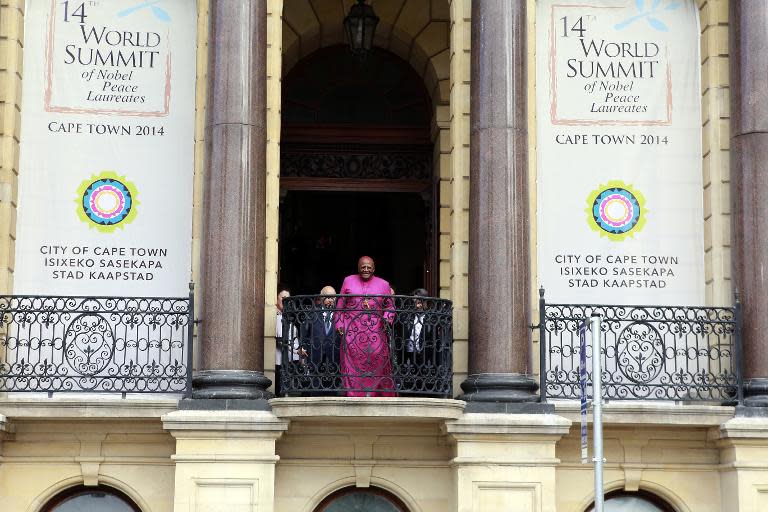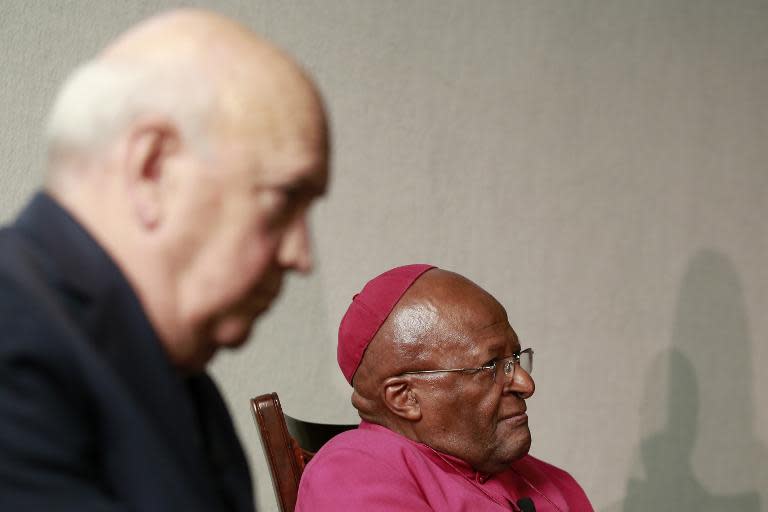South Africa 'refuses' Dalai Lama visa for Nobel summit
South Africa has refused to grant a visa for the Dalai Lama to attend the World Summit of Nobel Peace Laureates in Cape Town next month, his representative said Thursday. The government "conveyed by phone to me they will not be able to grant the visa for the reason that it would disturb relations between China and South Africa," Nangsa Choedon told AFP. The refusal could provoke a boycott of the 14th annual peace summit, according to a spokesman for South Agfrican laureate and former archbishop Desmond Tutu. "I have heard that if the Dalai Lama is not allowed into the country, other invited guests have said they will not come," Roger Friedman said. The government confirmed that it had received a visa application from the Dalai Lama but suggested that a decision had not yet been made. "The application will be taken through normal due process. The relevant authorities will communicate with the applicant thereafter," the department of international relations said. Two years ago, the country's top court found that the government had acted unlawfully by dragging its heels on a visa application by Tibet's exiled spiritual leader until it was too late. China, which accuses the Dalai Lama of covertly campaigning for Tibet's independence, regularly uses its growing economic and political clout to put pressure on governments around the world to limit contact with the Dalai Lama. China is one of South Africa's major trading partners. The Nobel summit in Cape Town in October is backed by foundations representing four South African peace laureates -- Tutu, Nelson Mandela, FW de Klerk and Albert Luthuli. Along with the surviving South Africans -- Tutu and De Klerk -- the organisers say 13 individuals and eight organisations had confirmed that they would attend the summit, including former Soviet president Mikhail Gorbachev. - Latest refusal - Choedon said she had not yet received written confirmation of the refusal, but if confirmed, this will be the third time in five years that the Dalai Lama has been refused a visa to visit South Africa. Each refusal has been met with an outcry from South Africans who feel it is a betrayal of the commitment to human rights embraced by the government since the end of apartheid 20 years ago. But a spokesman for De Klerk, the South African former president who won the Nobel prize alongside liberation icon Nelson Mandela, said he did not think a boycott of the summit would be the right response. "I think the message has gone out that boycotting the summit would be the very worst way of protesting," Dave Steward, executive director of the FW de Klerk Foundation, told AFP. "The best way would be to come to the summit and celebrate the 20th anniversary of our democracy and then make any views they want to make known at the summit." He said a refusal of a visa for the Dalai Lama would be "the antithesis of the values of our constitution". The Dalai Lama was last barred from entry in 2011, when he was invited to give a lecture as part of celebrations for Tutu's 80th birthday. That led to a court challenge by opposition parties, and a finding by the Supreme Court of Appeal that "the matter was deliberately delayed so as to avoid a decision". At the time, Tutu described the African National Congress government as being "worse than the apartheid government". The Dalai Lama was also denied a visa in 2009, but had visited three times before that and was personally welcomed by former president Mandela. The Inkatha Freedom Party, one of the parties that brought the previous legal case, said it would "follow up" on the matter this time too. "It's embarrassing that the government would go to such lengths to prevent the Dalai Lama from coming here," Sibongile Nkomo, the party secretary general told AFP.





